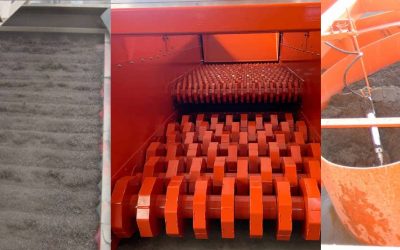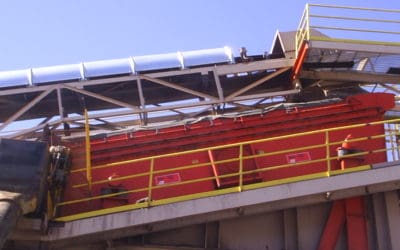With the global surge in construction and mining projects, the need for vibrating inclined and horizontal screens is also growing. These screens are integral to processing facilities that sort residual materials, such as gravel, sand, and rocks. Properly sorting these materials is critical to ensuring efficient downstream processing.
In this blog post, we’ll break down the key differences between these screens, explore their benefits and limitations, and help you determine which option aligns with your operational goals.
Inclined Screens
As the name suggests, inclined screens are angled screens that take advantage of gravity to help shuffle materials down the screen for proper separation. Often angled between 15 and 30 degrees, the screen is well structured to quickly process hefty materials from construction and mining operations. As a versatile screen, you can find it in both non-vibratory and vibratory setups.
Pros
- Production capacity: Typically operating at a higher production capacity, their gravity-assisted flow can move more materials faster than horizontal screens
- Cost: Inclined screens usually have a slightly lower cost to entry than horizontal screens due to their simpler design and few moving components
- Versatility: Capable of handling larger materials, these screens can sort a wider range of particle types
- Energy efficiency: Due to the assistance of gravity, these screens require less power to operate
- Maintenance: With a less complex design, and fewer moving parts, inclined screens require less maintenance and experience fewer mechanical strains
Cons
- Sorting accuracy: Due to their quick material sorting, inclined screens are less thorough in separating fine and smaller-sized materials
- Operational space: With their angular setup, these screens require higher ceilings or an outdoor processing space
- Wet materials: Inclined screens often face more challenges sorting wet or moist materials and can get stuck or need more regular cleanings
Horizontal Screens
These screens rely solely on mechanical vibrations to sift through and transport residual construction and mining materials. Designed with more-complex moving parts, the horizontal screen is very precise when sorting fine materials that require higher precision and sorting accuracy.
Pros
- Sorting accuracy: Horizontal screens are better suited to sorting fine and small-sized materials and often provide more accurate sorting than inclined screens
- Compact design: Taking up less vertical space, horizontal screens are optimal for operations with limited space or lower ceilings
- Difficult material handing: Horizontal screens are one of the most effective screens for handling wet, sticky, or abrasive materials
- Controlled material flow: The flat orientation of the screen allows for a more-controlled flow of materials through the screen, depending on their size, weight, texture, etc.
Cons
- Processing speed: Without the support of gravity moving materials through the screen, horizontal screens can’t process as high a quantity of materials per hour as the inclined vibrating screen
- Potential for material build-up: Flat surfaces are more prone to material build-up, requiring more frequent cleaning or maintenance
- Energy efficiency: Horizontal screens require more energy to move materials across the flat surface, consuming higher volumes of energy
BIVITEC®: Combining the Best of Inclined and Horizontal Screen Technology
The BIVITEC® vibrating screen merges the efficiency of an inclined screen with the precise sorting capabilities typically found in horizontal screens.
Using high-acceleration forces across flexible polyurethane vibratory screens, the BIVITEC® achieves dependable, clog-free sorting. This advanced design is powerful enough for high-capacity production yet reduces maintenance demands. Ideal for aggregates, mining materials, and other particles like sand, coal, compost, and shredded tires – the BIVITEC® is built to handle the toughest screening challenges with accuracy and reliability.
To learn how the right equipment can elevate your screening process, contact AEI today.


